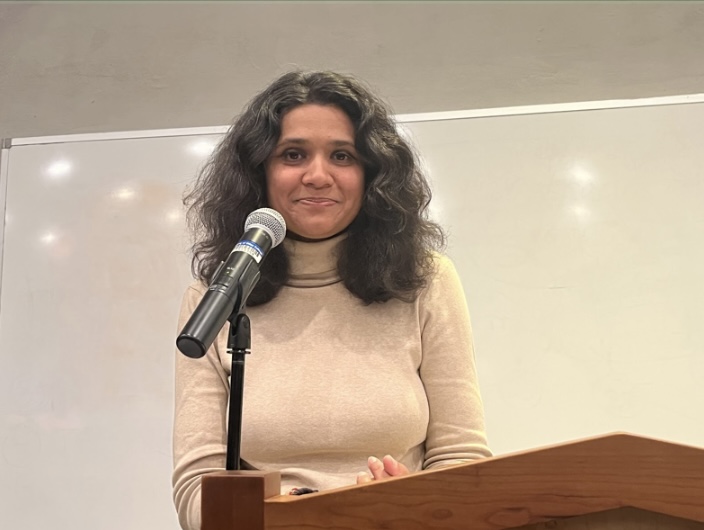Misha Rai: Harry F. and Mary Ruth Jackson Lunch Hour Series
February 26, 2023
The seats in MacFarlane Auditorium were filled with more than 40 attendees on Wednesday, Feb. 22 to listen to fiction writer Misha Rai read her work.
Rai, who was raised in India, won the Dogwood Literary Prize in Nonfiction of 2018 for her essay entitled “To Learn About Smoke One Must First Light a Fire.” She is a writer, assistant professor of creative writing and English at Sewanee: The University of the South and an editor for the Kenyon Review.
Her readings were part of Utica University’s Harry F. and Mary Ruth Jackson Lunch Hour Series for literature. She read the first half of her award winning essay and a snippet of her prose “Lessons in Loss.”
Ever since she was a child, Rai wanted to be a writer, but was met with concern and criticism. Between sips of water and banter with the audience, she detailed her journey from journalism to being a writer and teacher.
According to Rai, after finishing the tenth grade exams in India, students will decide very quickly what field they will go into. In the throes of uncertainty but wanting to write, she entered a school where she had to choose between a law track or a journalism track and decided to pursue journalism.
“After your first semester [in school], you begin to intern at other newspapers. I went to school, but for ten hours I would work for a paper,” Rai said. “I did that for two and a half years and I loved it, but I realized very quickly that I wasn’t very good at being a hard journalist.”
With a smile, she detailed how she got a master’s degree in the U.K. and started an internship at the National Human Rights Commission, which then was followed by projects with the Ministry of Women & Child, India, and UNICEF.
The impacts of her journalistic endeavors weighed heavily on Rai, to which she cited nightmares and the slow pace of change as the push to apply for a master’s programs in creative writing and future Ph.D.
“I really wanted to write and slowly the world just seemed harder and harder, and change seemed to be really slow, and there was a lot of corruption,” Rai said. “I was waking up from nightmares from the work I was doing and I started applying for writing programs. It took three tries for me to get in, and then I got in, and now I’m here.”
Her journey into teaching was not one she expected from the start, but the result of an impact a pedagogy professor, Deborah Coxwell-Teague from Florida State University, made on her.
“She taught so well that I fell in love with teaching,” Rai said. “And I love teaching my students, they [are] from so many different backgrounds. I was lucky after that, I feel like my hard work and talent met luck at the same time, and I won a fellowship at Kenyon Review and went to work there, and so I’ve been writing for the past 12 years.”
During her time as a journalist, she learned tactics of investigative journalism that ebb into her creative processes. As a writer, she is interested in literary suspense and collecting pieces of research for her writing.
“You’re trying to figure out whodunnit, howdunnit, but also trying to figure out character,” Rai said. “Like, how people’s characters change and like, the emotion that you’re excavating from someone’s inner life, and there’s like a two-pronged joy in that.”
Rai’s award winning essay, which was written for a class, touches on her family history, which she cites as a difficult thing to write about.
“I am a vulnerable person, I live with my heart on my shirt-sleeve all the time, and I think one of the prerequisites of being an artist is being vulnerable,” Rai said.
For those who do not have the privilege or opportunity to pursue their dreams, Rai advised that they work towards the things they enjoy however they can.
“Do something in your life that makes you happy. I’m not saying pursue that as a career, I’m saying whatever career you choose, whatever it ends up being, keep a little bit of yourself for yourself,” Rai said. “Keep a little bit of yourself for yourself because the world can be a hard place and you need to find a way to keep [those things that make you happy], and not all of us have the privilege.”
Information about Misha Rai can be found online at her website, misharai.org, as well as on social media. Her work can also be found in the Kenyon Review.





































































































































